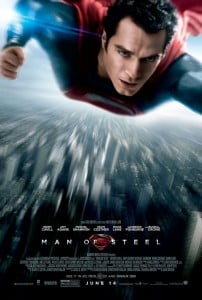 The new Superman film, Man of Steel, is a good movie with a great theme.
The new Superman film, Man of Steel, is a good movie with a great theme.
It is a competently directed story of a powerful alien who grows up on Earth with human parents; who comes to love his adopted planet and the people living on it; and who, as an adult, must defend his planet from other aliens of his race who want to destroy humanity and rebuild their home world in the ashes. The actors do a fine job: Standouts are Ayelet Zurer as Superman’s mournful yet steadfast birth mother, Kevin Costner as Superman’s Earth father, Diane Lane as his Earth mother, and Henry Cavill as the quiet but steady Man of Steel.
The main problem with the movie is that it feels rushed throughout. It begins with a lengthy sequence of the final days of the alien home world of Krypton, but the story it sketches is far too complex to convey sufficiently in a prelude to a film. The film follows the young Superman—Clark Kent to his human companions—as he struggles to control his powers and find his place in an alien world; and, although some of the related scenes are very nicely done, this aspect of the film is substantially underdeveloped. Then the alien invasion becomes a flurry of barely comprehensible plot turns, explosions, and high-speed aerial battles. Especially disappointing on this score is that the film shows vast destruction, yet never pauses to recognize the horror of the resulting carnage.
 The film’s greatest strength is that it compellingly dramatizes its theme, the moral virtue of pride, or what Ayn Rand calls “moral ambitiousness.” Superman is a Man of Steel not only because he is nearly indestructible, but because he is a man of great strength of character. He wants to do the right thing, and he does—in contrast to the alien invaders, who explicitly say they’ve “evolved” beyond morality. The theme comes through when Jor-El, Superman’s birth father, explains that every person can choose to be a force for good; when Jonathan Kent tells his adopted alien son that what matters for his future is his strength of moral character; when the young Clark Kent refrains from punching a bully, knowing the devastation that would cause; when, as an adult, Superman stands to fight his enemies; and when various minor characters courageously fight to defend their values.
The film’s greatest strength is that it compellingly dramatizes its theme, the moral virtue of pride, or what Ayn Rand calls “moral ambitiousness.” Superman is a Man of Steel not only because he is nearly indestructible, but because he is a man of great strength of character. He wants to do the right thing, and he does—in contrast to the alien invaders, who explicitly say they’ve “evolved” beyond morality. The theme comes through when Jor-El, Superman’s birth father, explains that every person can choose to be a force for good; when Jonathan Kent tells his adopted alien son that what matters for his future is his strength of moral character; when the young Clark Kent refrains from punching a bully, knowing the devastation that would cause; when, as an adult, Superman stands to fight his enemies; and when various minor characters courageously fight to defend their values.
On the whole, the film’s strengths outweigh its weaknesses. The fact that a blockbuster motion picture can be made today about the virtue of moral pride—and that Americans are flying to the theaters to see it—says something very hopeful about the state of the culture. And it shows why Superman is the quintessentially American superhero.
Like this post? Join our mailing list to receive our weekly digest. And for in-depth commentary from an Objectivist perspective, subscribe to our quarterly journal, The Objective Standard.
Related:


![[TEST] The Objective Standard](https://test.theobjectivestandard.com/wp-content/uploads/2017/10/logo.png)











